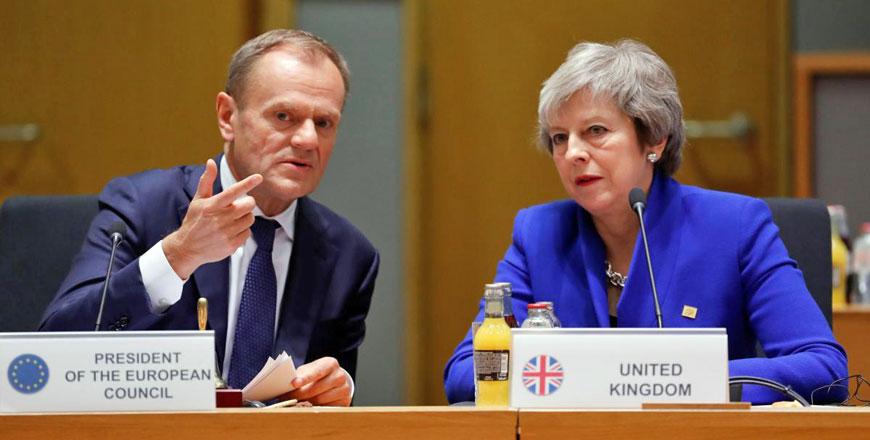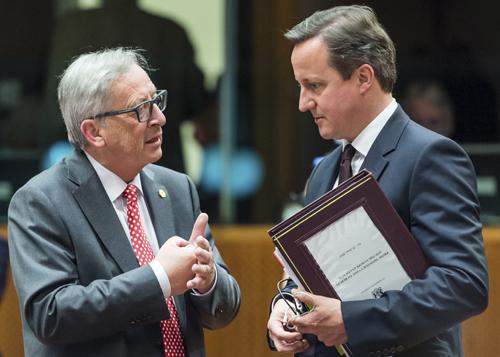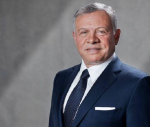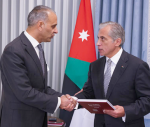You are here
Brexit anxiety eats into NATO summit
By Reuters - Jul 10,2016 - Last updated at Jul 10,2016

From left to right: Ukraine’s President Petro Poroshenko, US President Barack Obama, Germany’s Chancellor Angela Merkel and France’s President Francois Hollande arrive to stand for a photograph after their meeting alongside the NATO Summit in Warsaw, Poland, on Saturday (Reuters photo)
WARSAW — Officially the talk at this week’s NATO summit in Warsaw was all about deterring a resurgent Russia, supporting Ukraine and Afghanistan, and protecting Baltic NATO members. But in the corridors, there was only one dominant anxiety — Brexit.
Britain’s referendum vote to leave the European Union has triggered uncertainty across the Atlantic and around the continent, which spilled over at the NATO event. Big time.
“We are at a NATO meeting but most of the discussions have not been about NATO issues, they have been about the outcome of the referendum and the consequences,” Britain’s Foreign Secretary Philip Hammond said after a dinner with his 27 NATO counterparts.
Outgoing Prime Minister David Cameron, greeted with more sympathy than reproach over the result which prompted him to resign, took every opportunity to reassure allies that Britain would remain fully committed to European and international security even though it was leaving the EU.
“Britain is going to think through all the ways we can keep our strength and our power in the world. This is not an exercise of national vanity, this is all about Britain’s interests. It is perfectly possible to do that,” he told reporters on Saturday.
Indeed NATO officials said the British, who have Europe’s biggest defence budget, seemed at pains to compensate for Brexit by pledging more commitments to NATO operations.
Cameron also announced an early parliamentary vote on modernising Britain’s Trident nuclear deterrent.
US President Barack Obama was keen to ensure Washington’s closest ally in Europe is not sidelined or punished by European partners as a result of a vote that he had warned against.
Obama quizzed the leaders of the EU’s two main institution, Donald Tusk and Jean-Claude Juncker, in private talks about what trade terms Britain could expect and how soon a deal could be cut to reassure markets, officials present at the meeting said.
Quick settlement
“Obama was quite keen to push for a quick settlement of Brexit,” a European official said. “Both Tusk and Juncker took him on a pedagogic route and stressed it is important to keep the remaining 27 [EU states] united. If we go superfast, we could lose that unity.”
For now, it is Britain holding up the launch of withdrawal negotiations, with Cameron leaving the decision on when to trigger the EU exit clause, starting a two-year divorce process, to his successor, who will not be chosen by the ruling Conservative Party until September.
White House deputy national security adviser Ben Rhodes said participants in the Obama-EU meeting had recognised “just how important it is that this be done in a way that not upset financial markets that not upset global economic stability”.
“It was clear from the meeting that this is not going to be done in a way that is punitive towards the United Kingdom but rather as a path to finding a new relationship,” he said.
EU, French and German officials have made clear that Britain will not be able to keep full access to Europe’s lucrative single market, notably for its big financial services sector, unless it accepts EU rules, including allowing free movement of EU workers. Both candidates to succeed Cameron have said they will restrict immigration.
The Americans, who are losing their strongest advocate inside EU councils, are not alone in fearing the consequences.
Turkish President Recep Tayyip Erdogan asked Cameron in a private meeting who would argue for Turkey’s EU membership bid once Britain was gone, said a Turkish source. The answer — Italy and the Netherlands — did not seem much of a consolation.
Lithuanian President Dalia Grybauskaite, who treasures London’s forthright stance towards Russia and military support for the Baltic states, told reporters: “I hope that withdrawal from the EU will put even more pressure on Britain to be more active on security matters. I am sure that will happen.”
Related Articles
BRUSSELS — European Union leaders warned the British parliament not to wreck Theresa May’s Brexit deal, saying a package agreed with the pri
BRUSSELS — European Union leaders say they are increasingly frustrated that British Prime Minister David Cameron has not made concrete propo
AMMAN/WARSAW — NATO allies agreed on Saturday to increase cooperation with Jordan as part of a plan to boost the alliance’s support fo















